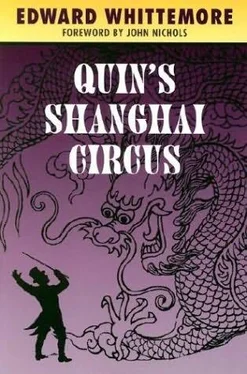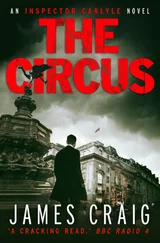Edward Whittemore - Quin’s Shanghai Circus
Здесь есть возможность читать онлайн «Edward Whittemore - Quin’s Shanghai Circus» весь текст электронной книги совершенно бесплатно (целиком полную версию без сокращений). В некоторых случаях можно слушать аудио, скачать через торрент в формате fb2 и присутствует краткое содержание. Жанр: Фэнтези, на английском языке. Описание произведения, (предисловие) а так же отзывы посетителей доступны на портале библиотеки ЛибКат.
- Название:Quin’s Shanghai Circus
- Автор:
- Жанр:
- Год:неизвестен
- ISBN:нет данных
- Рейтинг книги:3 / 5. Голосов: 1
-
Избранное:Добавить в избранное
- Отзывы:
-
Ваша оценка:
- 60
- 1
- 2
- 3
- 4
- 5
Quin’s Shanghai Circus: краткое содержание, описание и аннотация
Предлагаем к чтению аннотацию, описание, краткое содержание или предисловие (зависит от того, что написал сам автор книги «Quin’s Shanghai Circus»). Если вы не нашли необходимую информацию о книге — напишите в комментариях, мы постараемся отыскать её.
Quin’s Shanghai Circus — читать онлайн бесплатно полную книгу (весь текст) целиком
Ниже представлен текст книги, разбитый по страницам. Система сохранения места последней прочитанной страницы, позволяет с удобством читать онлайн бесплатно книгу «Quin’s Shanghai Circus», без необходимости каждый раз заново искать на чём Вы остановились. Поставьте закладку, и сможете в любой момент перейти на страницу, на которой закончили чтение.
Интервал:
Закладка:
Normally the policeman or one of the other corporals in his unit would have been sent to investigate the murder of the elderly woman, but this time everyone on duty at Kempeitai headquarters had been placed on special alert. A Japanese soldier was being held on suspicion of espionage. A crippling backache had led to a doctor’s examination, in the course of which the doctor had discovered a microfilm bearing highly sensitive military and political information.
The soldier, also a corporal, tried to commit suicide by jumping out of a window, but a tree broke his fall and he only suffered a broken arm. Now he was being held in a ground-floor room empty save for the cushion on which the interrogating officer sat. Even the glass from the barred window had been removed.
The policeman’s Captain questioned the prisoner a full day and night. At the end of that time he retired for a few hours of sleep after learning only two minor facts, the code name for the espionage network and the unknown disease that had caused the corporal’s backache. The policeman was told to stay in the room and not take his eyes off the corporal.
The corporal, little more than a boy, had the delicate features and delicate body of a young girl. Dead leaves blew in through the window along with the cool autumn air. The boy asked if he could use the policeman’s overcoat, and the policeman gave it to him after first emptying out the pockets.
There was a secret in that overcoat that had tormented the policeman ever since it was issued to him in the winter of 1935, a secret that had to do with size. In the supply shipment received by his unit that year there had been included a monstrous mistake by the manufacturer, an overcoat so large it could have gone around three or four large men.
The policeman, who was small, was given the coat as a joke and told not to cut it but to take it in, a project that had lasted just over a week. During that time he went about in the cold weather unprotected while the other men ridiculed him.
The young corporal now turned the overcoat over before putting it on. He saw where it had been roughly stitched. Suddenly he held it up and laughed.
What’s so funny? said the policeman.
This is, said the boy.
Why?
Because I made it. That coat got me fired from the factory. I was thinking about my mother and the coat came out all wrong, so they fired me. I had to do something, so I went into the army. If it weren’t for that coat I wouldn’t be here today.
The boy stopped laughing. He moaned the name Miya and began to cry.
The policeman didn’t hear the name or see the tears, he saw only the jeering faces that had insulted him two years before when he was cold. The Captain came back an hour later to find the prisoner crumpled up in the corner, his head battered out of shape, his face unrecognizable. The policeman was sitting on the cushion by the window watching the dead leaves fall in the yard.
The Captain flipped the safety on his revolver, but at the last moment kept himself from shooting his subordinate in the head.
Soon afterward the Captain was standing in front of the desk of his commanding officer, a General, the man from the apartment in Shanghai who had once been his patron and protector. There was no need for the Captain to be told that the death of so important a prisoner was unpardonable. At the same time as he turned in his report he made a formal request that both he and the policeman be transferred to a front-line infantry unit.
A month later the Captain was killed in a reckless assault on a Chinese machine gun emplacement. The policeman, however, was still carrying his favorite blackjack the December night his regiment broke ranks outside the gates of Nanking.
Fires were everywhere. For a thousand years the policeman stabbed and shot and clubbed Chinese, for ten thousand years he beat victims and mutilated them and burned them. Then all at once he turned a corner and found himself facing the man from the apartment in Shanghai, from the toilet in Mukden, a man he knew from the winter morning when his father had been found with his face gone and he had had to wait beside the road with a bowed head until an automobile passed bearing the powerful Baron who owned his family’s land and all the land for miles around.
He had been only eight years old, but he had peeked up and caught a glimpse of the passing face. The man had held his head differently then, not in that stiff, rigid way, and that was what had confused the policeman in the Shanghai apartment and the Mukden toilet. But now in the screams and shadowy firelight of Nanking the policeman was no longer confused, his head cleared, and he knew exactly whom the face belonged to.
He struck him with his blackjack, the General went down. He dragged him out of the alley into a deserted courtyard, stripped off his uniform, rapped his testicles to hear the sounds from the icy Manchurian cellars.
A low moan. A quiet dying moan.
The fires burned and the policeman tapped out the rhythms in his head, the footsteps on the terraced hills of his childhood, the giant steps to nowhere. He tapped and gently tapped until he felt the sack in his hand growing cold. He severed the sack, shredded the testicles, knotted them around the General’s neck and squeezed.
One eye was still wide open staring at him. He ripped it out and threw it away.
Screams.
A collapsing burning wall, flames leaping into the air, the General’s epaulets shining in the gloom.
He dropped his trousers, squatted over them before loping out of the courtyard and down the alley.
After a month of arson, torture, and murder along the banks of the Yangtze the policeman was given a summary court martial. While racing a truck through a group of children in a village a machine gun mount had fallen from the truck to the ground. Due to the cries of the children he had failed to hear it. He was found guilty of negligent loss of property. The cost of the mount was deducted from his pay and he was transferred out of the war zone back to his old Kempeitai unit in Manchuria.
The next eight years passed without incident. More and more men were shipped out to the Pacific, to the Philippines, to Okinawa. The barracks in Mukden were unheat-ed, food was scarce. Days he spent in the icy cellars, nights he took long walks into the countryside. One hot summer morning the Russians crossed the border and quickly overran what had once been the Kwangtung army.
As a fascist militarist the policeman was sent with the other Japanese prisoners to a labor camp in Siberia and put to work mining salt, which they did with their hands since the Russians had neither picks nor shovels. His eyes became infected from the salt, temporarily blinding him. Daily classes were held in the new order of justice the prisoners were to carry with them back to Japan.
They were encouraged to grow food or otherwise supplement their rations. The policeman’s specialty was a kind of beer made from tundra weeds, homemade beer being traditional among the peasants of the Tohoku. The Russian guards liked it so much there was seldom any left for him, but for some reason he seemed happy to let them have it.
The end of the third year came. The prisoners, fully indoctrinated, were now ready to return to Japan to begin their revolutionary work. On the last night there was a banquet where the guards and prisoners embraced, sang, wept, congratulated each other on now being comrades in a common cause. The policeman left the banquet early to check the special batch of beer he had brewed for the celebration.
Around midnight the Russian guards began to arrive, most of them already drunk. In all, eight of them came, although more had been invited and fewer might have turned up. They sat in the pine grove laughing and singing as he poured out the frothy brew.
Читать дальшеИнтервал:
Закладка:
Похожие книги на «Quin’s Shanghai Circus»
Представляем Вашему вниманию похожие книги на «Quin’s Shanghai Circus» списком для выбора. Мы отобрали схожую по названию и смыслу литературу в надежде предоставить читателям больше вариантов отыскать новые, интересные, ещё непрочитанные произведения.
Обсуждение, отзывы о книге «Quin’s Shanghai Circus» и просто собственные мнения читателей. Оставьте ваши комментарии, напишите, что Вы думаете о произведении, его смысле или главных героях. Укажите что конкретно понравилось, а что нет, и почему Вы так считаете.












